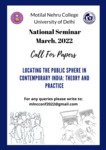 | NCLPS-2022: National Conference on "Locating the Public Sphere in Contemporary India: Theory and Practice" Motilal Nehru College, South Campus, University of Delhi, Benito Juarez Road New Delhi, India, March 21-23, 2022 |
| Conference website | https://sites.google.com/view/mln-nclps-2022/home |
| Poster | download |
| Abstract registration deadline | February 15, 2022 |
| Submission deadline | March 1, 2022 |
NCLPS-2022 is a National Conference on "Locating the Public Sphere in Contemporary India: Theory and Practice". This Conference is being organised by Motilal Nehru College (Day), University of Delhi from 21st – 23rd March, 2022.
Jurgen Habermas’s influential work on public sphere has had a major impact over multiple disciplines and has contributed to discussions on issues such as literature, media, democracy, and civil society. Public sphere is the space in which private citizens come together as public to discuss matters of 'public concern' or 'common interest'. The 'public sphere' thus is "a realm of our social life in which something approaching public opinion can be formed. Access is guaranteed to all citizens. A portion of the public sphere comes into being in every conversation in which private individuals assemble to form a public body" (1989). The nature of public sphere centres on the idea of participation and how public opinion democratically becomes political action and morally relevant.
Though the nature of public sphere centres on the idea of inclusivity, it has been argued that the bourgeois public sphere was in fact constituted by a number of significant exclusions. In contrast to Habermas’ assertions on inclusivity without regard to status, Nancy Fraser claims that the public sphere is 'anything but accessible to everyone’ (1992). The marginalized groups, though excluded from a universal public sphere, formed their own public spheres, and Fraser termed this as a subaltern counter public or counter-public.
Habermas defines the early public sphere as consisting of organs of information and political debate such as literature, newspapers, journals as well as institutions of political discussion such as parliaments, political clubs, literary salons, public assemblies, pubs and coffee houses, meeting halls and other public spaces.
How exclusionary is the public sphere in contemporary India in terms of caste, class and gender, is one of the areas that this conference will focus on. How do those at the bottom of the economy figure in this public sphere? And what are the strategies employed and gains won by those who fight to enter it? The transformations of the public sphere that Habermas describes depend largely
on its continual expansion to include more and more participants. According to Calhoun, Habermas suggests that this inclusivity brought a decline in the quality of discourse, but contends at the same time that Habermas' two-sided constitution of the category of public sphere meant that it was simultaneously about the quality or form of rational-critical discourse and the quantity of or openness to popular participation. How is the public sphere in contemporary India transformed by the increasing participation of the counter publics is a question that this conference will attempt to address.
In the digital age, the discussion about the public sphere has become increasingly relevant and, at the same time, increasingly problematic. Computer–mediated communication has taken the place of coffeehouse discourse, and issues such as media ownership and commodification pose serious threats to the free flow of information and freedom of speech on the Web.
In examining these issues, the seminar proposes to look at contemporary India through a study of the literary, social, and political environment that both affects and is in turn affected by the public sphere.
The Organising Committee welcomes research papers from a wide variety of interdisciplinary and theoretical perspectives, and submissions are organised into (but not necessarily confined to) the streams and sub-streams listed below:
-
World Wide Web: the new public sphere?
-
Is social media driving the contemporary public sphere?
-
From exclusive to insular: the contemporary public sphere.
-
Public sphere and minorities.
-
Public sphere and the study of democracies.
-
Public sphere as the central arena for societal communication.
-
Public sphere: a normative theory?
-
Public sphere and manufactured consent.
-
New Media: a substitute for authentic discourse?
-
Citizenship via cyberspace.
Submission Guidelines
Prospective participants are requested to send a 300 words long abstract to mlncconf2022@gmail.com with a 50-words bio-note and keywords. Please use Times New Roman 12-pt fonts for English and Kruti Dev 10-pt fonts for Hindi.
Points to Remember:
➢ Conference Dates: 21st – 23rd March, 2022
➢ Abstract Submission Deadline: 15th February, 2022
➢ Results of abstract review returned to authors: by 18th February, 2022
➢ Submission of final paper: 01st March, 2022
➢ Registration Fee: INR 500 for paper readers.
➢No registration fee for participants.
➢ Final date of registration and fee payment: 01st March, 2022
For any questions or queries please write to: mlncconf2022@gmail.com
Webpage- http://www.mlncdu.ac.in
http://www.mlncdu.ac.in/pdf/CFPSeminar.pdf
Committees
Program Committee
- Dr. Shrivatsa, Principal, Motilal Nehru College
Organizing committee
- Kuntal Tamang, Associate Professor, Dept. of English – Convenor
- Anand Kumar, Associate Professor, Dept. of History
- Yogesh Gupta, Associate Professor, Dept. of Political Science
- Vinita Jagdev, Associate Professor, Dept. of Economics
- Sandeep, Associate Professor, Dept. of Hindi
- Nita Mittal, Associate Professor, Dept. of Computer Science
- Vidya Pradhan, Associate Professor, Dept. of Chemistry
- Simrata Bindra, Associate Professor, Dept. of Physics
- Shipra Gupta, Associate Professor, Dept. of Mathematics
- Chandan Karki, Associate Professor, Dept. of Commerce
- Priyanka Chaurasia, Assistant Professor, Dept. of Sanskrit
- Reena, Kumari, Assistant Professor, Dept. of Sanskrit
- Shilpy Malhotra, Assistant Professor, Dept. of English
- Ruchita Machal, Assistant Professor, Dept. of English
- Sarika Chhetry, Assistant Professor, Dept. of English`
- Sweta Kushwaha, Assistant Professor, Dept. of English
- Shilpa BSL, Assistant Professor, Dept. of English
Contact
For any questions or queries please write to: mlncconf2022@gmail.com
